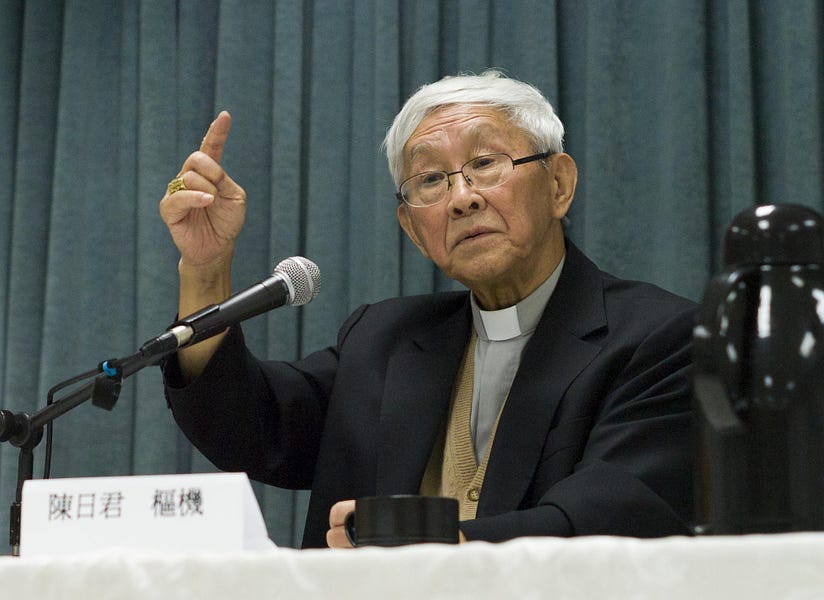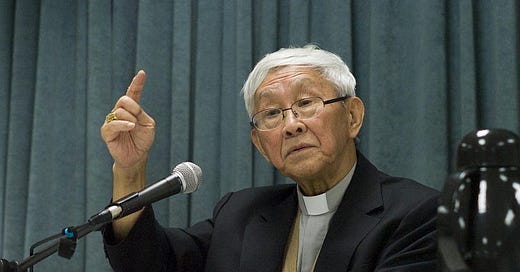
Cardinal Zen gets new trial date
The criminal trial of Cardinal Joseph Zen Ze-kiun is set to start next week after it failed to begin as scheduled.

The criminal trial of Cardinal Joseph Zen Ze-kiun is set to start next week after it failed to begin as scheduled, The Pillar has learned.
The 90-year-old cardinal was due to appear in court in Hong Kong on Sept. 19, but the hearing did not take place after a judge in the case tested positive for COVID-19.
The hearing was initially rescheduled tentatively for Wednesday, but will now begin on Sept. 26 sources close to the case have told The Pillar.
Why is Cardinal Zen facing trial?
The cardinal is one of the most prominent pro-democracy campaigners in Hong Kong, a former British colony with a population of 7.5 million people that became a special administrative region of China in 1997.
The Chinese government promised to maintain the city’s existing governmental and economic structures for 50 years after British rule under the “one country, two systems” principle, upholding Hong Kong’s Basic Law, which guaranteed the rights and freedoms of Hong Kong residents.
In 2019, the Hong Kong government attempted to pass legislation that would have allowed political detainees to be deported to mainland China to face trial. Months of mass demonstrations and protests led to a fierce police crackdown.
Although the extradition bill was withdrawn, Beijing imposed a sweeping national security law on Hong Kong in June 2020, curtailing civil liberties.
The Bishop Emeritus of Hong Kong was arrested in May in connection with his role as a trustee of the 612 Humanitarian Fund, which provided financial and legal aid to people arrested during the 2019 demonstrations.
Zen was originally held on national security grounds, including alleged collusion with foreign agents. But when the case comes to court, he will only face the charge of failing to register the fund appropriately.
Who is being tried alongside Cardinal Zen?
Other trustees of the now closed 612 Humanitarian Fund are also standing trial. They are the barrister Margaret Ng, the Cantopop star and pro-democracy campaigner Denise Ho, former lawmaker Cyd Ho, cultural studies scholar Hui Po-keung, and activist Sze Ching-wee.
All the defendants pleaded not guilty to the offenses in May.
What do we know about the trial?
In August, Principal Magistrate Ada Yim (who has now tested positive for coronavirus) heard a pre-trial session in West Kowloon Court and scheduled the trial for Sept. 19-23.
The prosecution won approval for the trial to be conducted in Chinese, not English. It is believed that this will affect the defense’s ability to cite relevant case law and present expert witnesses on the Hong Kong Bill of Rights Ordinance, which incorporated the provisions of the International Covenant on Civil and Political Rights into local law in 1991, and on which the jurisprudence related to free assembly and similar civil rights is substantially based.
The closing arguments will be made in English, according to the Hong Kong Free Press.
What’s the context?
The Vatican and China are expected to announce in the coming weeks that they have extended their “provisional agreement,” first signed in 2018 and renewed in 2020.
Zen is a scathing critic of the deal, which grants the Chinese Communist Party a joint role in the appointment of bishops to mainland dioceses.
Some China-watchers believe that the Communist authorities are using the Zen trial as a bargaining chip ahead of the deal’s renewal for a further two years.
What is the trial’s likely outcome?
If the cardinal was standing trial for national security crimes, he would almost certainly be facing a long jail sentence if convicted.
But as he is accused of failing to register the 612 Humanitarian Fund properly, it is likely — but not certain — that the court will impose a fine rather than imprison him and his fellow defendants should they make a determination of guilt.





